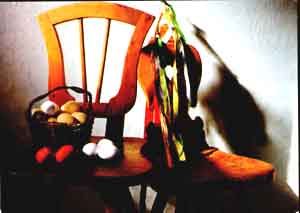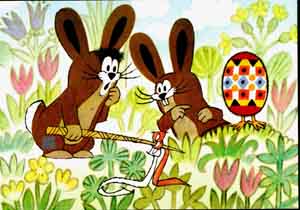The Czech word for Easter is VELIKONOCE, which means Great Night (Easter Sunday ?). English word Easter comes from "Eostre", the Anglo-Saxon Goddess of Dawn. How do you say "Velikonoce" in your languages ?
The best thing about Easter in Czechia is that it is a school holiday - Green Thursday, Big Friday, White Saturday, Easter Sunday and Easter Monday. Otherwise our students do not find it interesting (only three of us find Easter an important event during the year)
Just like Christmas, the religious importance of Easter is often forgotten today. Though people are still aware of the religious origin of Easter (death and resurrection of Christ), it has not become a serious religious holiday and not many people go to church at this time. For Christians in our country Easter begins 40 days before Easter Sunday. This period of time is known as Lent, when people give up some pleasant things like smoking or drinking alcohol. They may also fast. Churches are decorated and hold special services.
 Most Czech people participate rather in the secular side of Easter.
In the years past there used to be many customs attached to Easter. People have forgotten most of them. Unlike big cities in villages many traditions are still observed and practised. Different regions have their own traditions and customs.
Most Czech people participate rather in the secular side of Easter.
In the years past there used to be many customs attached to Easter. People have forgotten most of them. Unlike big cities in villages many traditions are still observed and practised. Different regions have their own traditions and customs.
From Green Thursday to White Sunday boys in a village form a group and walk through the village rattling with a special wooden rattle. The meaning of the rattling may be to chase away Judas. The boys also do not mind getting some small money.
The most spread symbol of Easter is a decorated egg or an egg shell. This tradition must be popular in your countries, too. Egg´s always been a symbol of spring and new life. In Czechia eggs are decorated by girls and women. There are many techniques to decorate Easter eggs and they usually require a certain level of skills. The easiest and probably the oldest technique was hardboiling them in bright colours, especially red colour, which is thought to be the colour of blood and life and perhaps sun and fire. You can also use wax, straw, watercolours, picture stickers, wire etc. Some Easter egg contests are held around Easter time. From this symbol a large industry has developed in the production of chocolate eggs. Nowadays decorating and giving real dyed eggs have largely disappeared. Chocolate eggs come in all shapes and sizes. We found out that the first chocolate eggs were produced in the 19th century in France and Germany. We have no custom of hiding and searching for eggs. In our country they are simply given to boys by girls.
There is also a tradition of baking a lamb ot a gingerbread lamb.
While girls decorate eggs, boys prepare their Easter whips.("pomlázka" in Czech) The Easter whip is a bunch of birches or twigs braided together. The more twigs, the more difficult it is to braid a whip. Boys used to make their own whips in the past, but this tradition is long gone and a whip can be bought in the stores and on the streets. We know that these birches were sold in Prague in 1610, so the custom is at least that old, but it may be much older.
This "whipping" certainly sounds terrible but in fact it is a gentle slapping on the shoulders and backs or elsewhere. At least it is expected to be gentle. Imagine a man whipping his beloved mother-in-law. Whipping is a purely men´s activity. Men say it is fun. What do the girls think ? Is it fun for them ? When boys / men set on their whipping trip through the village on Easter Monday, girls / women try to hide or run away. Boys stop at people´s homes and whip every girl / woman who lives in the house. Great Fun ! Boys also say an Easter carol asking for an egg or two. Actually they are not given only eggs, but also candies, fruits, money and adults are offered a glass of spirits. Many are drunk by the end of the day. Girls also fasten ribbons around the whip so they are beautifully decorated and at the end of Easter everything is pretty colourful - eggs, whips, men´s noses and women´s backs. ENJOY THE EASTER HOLIDAY !
The more twigs, the more difficult it is to braid a whip. Boys used to make their own whips in the past, but this tradition is long gone and a whip can be bought in the stores and on the streets. We know that these birches were sold in Prague in 1610, so the custom is at least that old, but it may be much older.
This "whipping" certainly sounds terrible but in fact it is a gentle slapping on the shoulders and backs or elsewhere. At least it is expected to be gentle. Imagine a man whipping his beloved mother-in-law. Whipping is a purely men´s activity. Men say it is fun. What do the girls think ? Is it fun for them ? When boys / men set on their whipping trip through the village on Easter Monday, girls / women try to hide or run away. Boys stop at people´s homes and whip every girl / woman who lives in the house. Great Fun ! Boys also say an Easter carol asking for an egg or two. Actually they are not given only eggs, but also candies, fruits, money and adults are offered a glass of spirits. Many are drunk by the end of the day. Girls also fasten ribbons around the whip so they are beautifully decorated and at the end of Easter everything is pretty colourful - eggs, whips, men´s noses and women´s backs. ENJOY THE EASTER HOLIDAY !